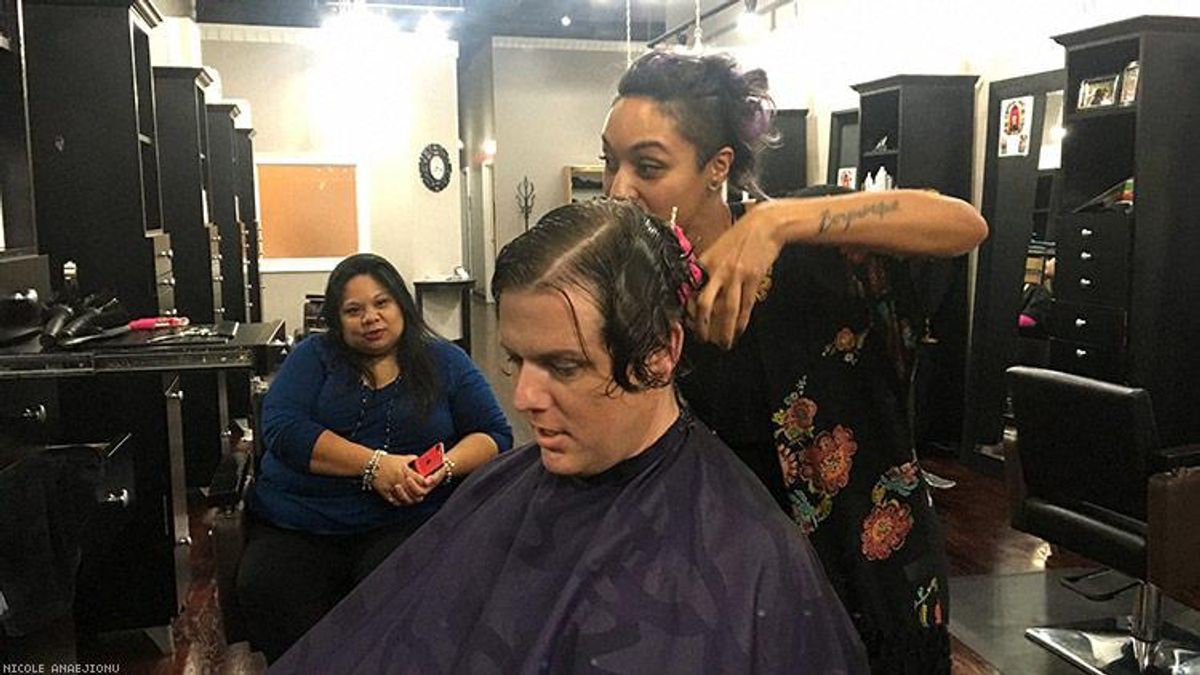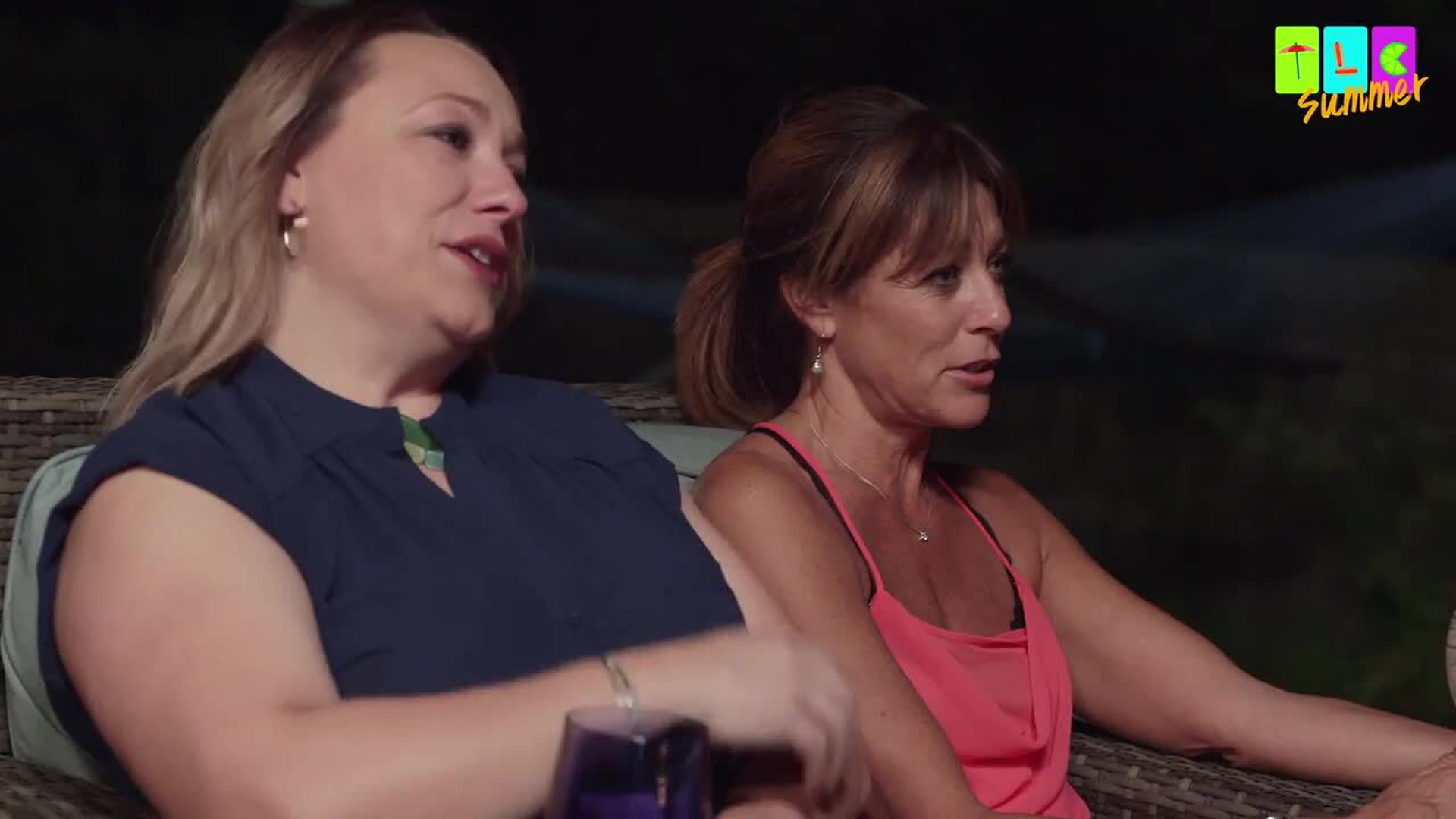Above: One of the couples on Lost in Transition -- Jennifer, in background, watches husband Lawren, who has come out as transgender, get a new hairstyle.
High school sweethearts who married and now live in a small, conservative town with their toddler son. A woman who left an abusive marriage and finally found someone who treated her well. A couple who run a law firm and are raising four children. A woman who married her love from college, a former U.S. Marine and motorcycle enthusiast.
These couples, featured on the TLC docu-series Lost in Transition, all appear to be opposite-sex pairs, but they are grappling with the realization that they're not: All the husbands have recently come out as transgender women.
The nine-part series, which premiered May 20, tracks the adjustments these families have to make, telling their stories with empathy for transgender people but also a recognition that when someone transitions, it affects their spouse and children as well.
"We hope that the series just kind of opens the door for some acceptance on both sides and helps people understand these journeys a little bit more," says showrunner Chaney Moon, who's also an executive producer of Lost in Transition.
"What I'm hoping is that when people see these real people on the series, it will elicit natural human compassion for the plight that these people go through," adds Jeanette Scottie Madden, a story producer on the series.
Madden knows more than a little about that plight. Madden, who has been married to her wife, Marcy, for more than 20 years, came out as transgender about seven years ago. "I know the story intimately, from the inside out," she says. But she also recognizes that each person's experience is unique.
The couples Lost in Transition follows are Stacy and Les (Leslie), who live in a small town in Washington State with their young son and grapple with revealing Leslie's gender identity to her coworkers at a gun shop; Cindy and Troy (Lucy), who met after Cindy's abusive marriage ended and had been together a decade when Troy came out; Jennifer and Larry (Lawren), who have four children, ages 8 to 16, and work together in Larry's law practice; and Beverly and AJ (Karen), the latter a former Marine, who met in college and are dealing not only with AJ's coming-out but the realization that one of their children is transgender.
The couples are extremely forthcoming about their lives and emotions, allowing the camera to capture painful moments as well as joyful ones, along with some behavior that's admirable and some that's not. The trans women open up about the deep depression caused by gender dysphoria -- one is so uncomforable with her body that she showers with her clothes on at one point, and some admit the pain is so great they've consider suicide. Their spouses sometimes display fear, confusion, or hostility in reaction to the news of their mates' transgender identity. But there are also instances of solidarity and support.
Moon and Madden began working on the series after the couples had been chosen -- creator Ronak Kordestani had some help from GLAAD in finding them -- but they're impressed with the degree of honesty the couples and their families are showing. "I think we all fell in love with the families," says Moon, a cisgender lesbian. "We had to be delicate, but they were so open and honest."
They have also been impressed by the accepting attitudes displayed by some of the series' subjects, especially the younger ones. "Jennifer and Lawren's kids were a beacon of light," Moon says. "It was nice to see the younger generation's take on things. They just have a built-in level of acceptance of who people are."
Some don't have that level of acceptance, but audience members can relate to that too, including those who have made a long journey to reach that level. Madden, who with her wife does education and advocacy around transgender issues through their nonprofit organization and publishing house, Zuzubean Press, says that of all the people on the show, the one her wife most relates to is Cindy, who's definitely struggling to accept that the love of her life is a trans woman.
Marcy, Madden says, "did not come to this place of being the world's greatest ally easily," just as the adjustment isn't easy for Cindy and some of the others on the series. But "our love got us past the natural human reaction of fear and confusion," Madden adds.
Madden and Moon both hope audiences will experience that love, or at least familiarity, and that it will lead them to a position of acceptance. Madden offers a quote from acclaimed author Jenny Boylan, who is trans: "You can never hate somebody whose story you know." "I find that to be true," Madden says.
Telling transgender people's stories is more important than ever with Donald Trump and his administration rolling back the incremental gains trans people and other historically marginalized populations had made under President Barack Obama. "They're like monkeys who caught their tails on fire and are running through the library at Alexandria, burning it all down," Madden says of Trump and his appointees.
She also points out that Lost in Transition showcases the diversity of trans people -- they don't all live in big cities or liberal college towns, and they don't all have the same political ideology. "Transgender people have every single opinion that every cisgender person has," she says. "Broadening the idea of the transgender experience is going to be a good thing."
"I hope [viewers] come away with a little bit more understanding," adds Moon.
Watch an exclusive clip from the show below.
Lost in Transition airs Sundays on TLC at 10 p.m. Eastern/9 p.m. Central. If you've missed the first couple of episodes, you can catch up on the TLC website.



















































































